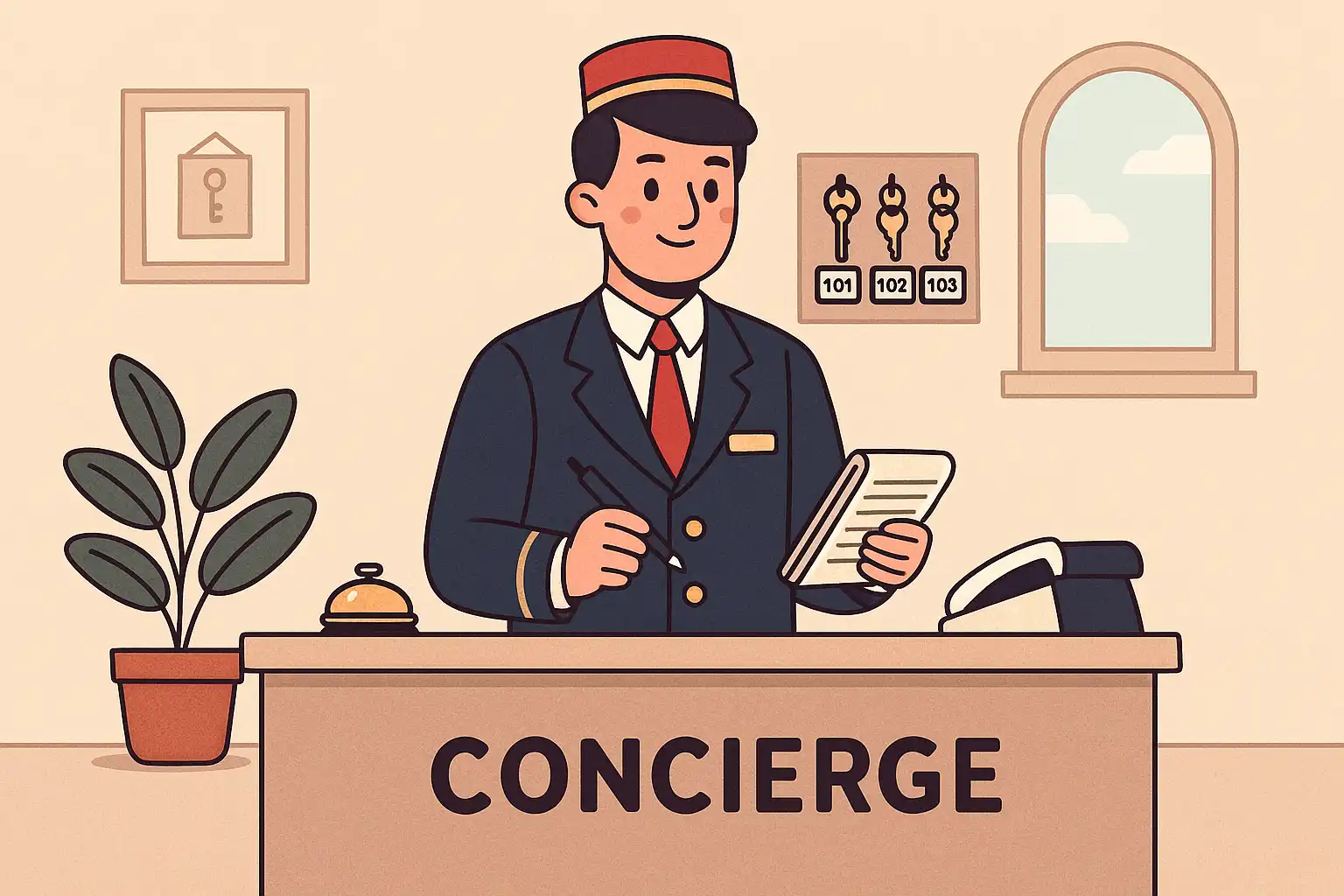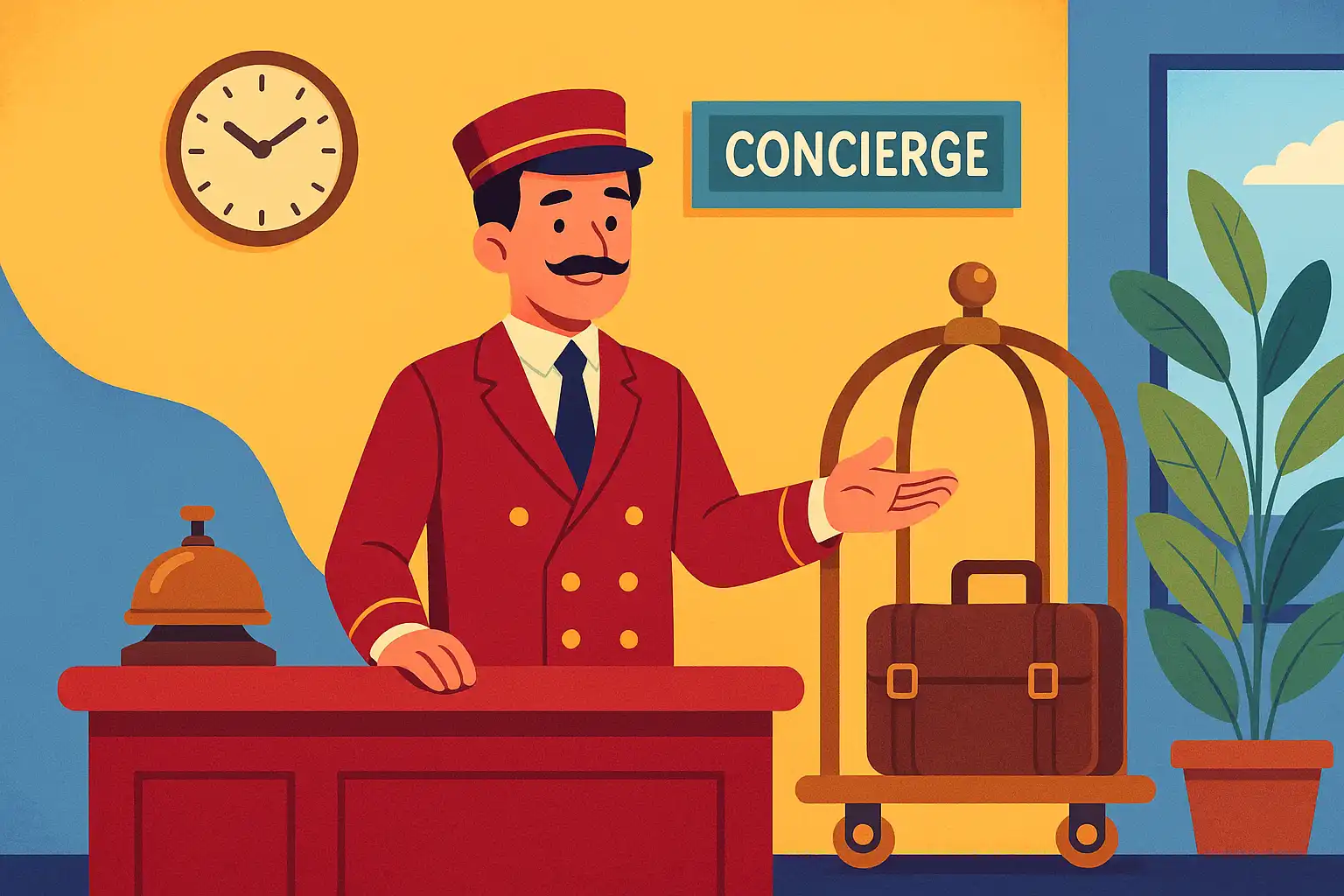Hotel Concierge: Roles, Responsibilities, and Career Path
Sep 30, 2025
 Mika Takahashi
Mika TakahashiPopular Categories
Hotel Technology & InnovationHotel Operations OptimizationDigital MarketingIndustry TrendsRevenue ManagementHospitality Industry
Popular Categories
Trending Post

Hotel Walk Letter Template: Professional Guest Communication

Online Travel Agents: What They Are and How They Work

Hotel Security Systems: Modern Protection Solutions

Hotel Advertising: Complete Guide to Boost Bookings and Revenue

25 Hotel Marketing Strategy Ideas for 2025: Complete Guide

AI Reservation Agent: Revolutionizing Hotel Booking and Guest Experience

PMS Communication: Streamlining Property Management Through Effective Guest Messaging
Table of contents
In today’s competitive hospitality world, what sets luxury hotels apart isn’t just fancy decor or plush beds—it’s the exceptional service that guests remember long after their stay. At the heart of this experience is the hotel concierge, a dedicated professional who turns ordinary visits into unforgettable memories by offering personalized attention and insider local knowledge.
Whether you’re thinking about a career in hospitality, managing hotel operations, or just curious about how luxury hotels create those wow moments, understanding the role of a concierge gives you a glimpse into how personalized service drives guest satisfaction and business success.
This guide covers everything you need to know—from daily duties and must-have skills to career growth and how hotels can build or improve their concierge services.

What is a Hotel Concierge?
A hotel concierge is more than just a friendly face at the front desk—they’re a specialized guest service professional who helps with personalized requests and offers expert local recommendations. Unlike front desk staff who handle check-ins and administrative tasks, concierges focus entirely on creating memorable experiences through their insider knowledge and outstanding service.
Think of the concierge as your personal assistant during your stay, bridging the gap between guests and hotel services. Their proactive approach means they anticipate your needs before you even ask, thanks to a vast network of local contacts and trusted vendors.
You might hear this role called Guest Relations Manager, Guest Services Representative, or Personal Assistant, but no matter the title, the goal is the same: to craft experiences that go beyond expectations with personalized attention and deep local knowledge.
Concierge services have evolved from their European roots into a broad spectrum of personalized help—from snagging those impossible dinner reservations to organizing private tours of local hotspots. It’s all about meeting the modern traveler’s desire for unique, memorable experiences.
Core Responsibilities of Hotel Concierges
What a concierge does can vary depending on the hotel’s size, location, and clientele. Their tasks range from providing basic information at mid-range hotels to offering highly specialized services at luxury resorts. Here’s a closer look at what makes their role so comprehensive, covering everything from guest arrival to departure.
Guest Welcome and Arrival Services
The concierge is often your first point of contact, making that initial greeting crucial for setting the tone of your stay. A warm welcome at the concierge desk signals the hotel’s commitment to personalized service.
Concierges often help with luggage, coordinate check-in details, and explain hotel amenities and policies to make sure guests feel comfortable and informed. They also arrange transportation—whether it’s an airport pickup or a taxi—so guests can start their visit smoothly.
Building a friendly rapport from the start helps ensure guests feel cared for throughout their stay.
Local Area Expertise and Recommendations
What really sets a great concierge apart is their deep local knowledge. They don’t just hand out generic brochures—they tailor dining recommendations based on your tastes, dietary needs, and budget.
They’re up to date on local attractions, museums, shopping spots, and entertainment venues, including seasonal events and hidden gems you won’t find in guidebooks. By understanding your interests and travel style, they can suggest activities that truly fit your preferences.
Reservation Management and Booking Services
Need a table at a fully booked restaurant? The concierge’s relationships with local venues can make it happen. They also handle tickets for theaters, concerts, sports events, and cultural performances, taking care of all the details so you don’t have to.
From arranging tours like wine tastings or museum visits to organizing transportation—whether a rental car, limo, or ride-share—they coordinate everything to make your plans effortless.
Special Request Fulfillment
Concierges handle those unique requests that make your stay extra special—think flower deliveries, surprise celebrations, or personalized services like laundry and shopping assistance.
They also cater to business travelers with services like printing, faxing, and meeting room setups. Attention to detail is key here, ensuring everything runs smoothly and guests feel truly pampered.
Whether it’s managing dietary needs, medication storage, or accessibility arrangements, concierges handle these with care and discretion, always aiming to create lasting memories through personalized touches.
Problem Resolution and Guest Advocacy
When issues arise, the concierge is often the first person guests turn to. They listen carefully, empathize, and work tirelessly behind the scenes to resolve problems—whether it’s a room issue or service hiccup.
They coordinate with other hotel departments to find solutions and offer alternatives when needed. Following up with guests ensures satisfaction and often turns a challenging situation into a positive experience, helping maintain guest loyalty.
Essential Skills and Qualifications
While entry-level concierge roles may only require a high school diploma, luxury hotels often seek candidates with hospitality degrees or specialized certifications. Training and experience in customer service are crucial for delivering top-notch service.
Communication and Interpersonal Skills
Excellent communication—both verbal and written—is at the heart of concierge work. Multilingual abilities are a big plus in international settings. Being a good listener helps concierges understand exactly what guests want.
A polished appearance and professional demeanor reflect the hotel’s brand and build guest confidence. Cultural sensitivity is essential when working with diverse international guests.
Negotiation and persuasion skills come into play when securing reservations or vendor services, especially during busy times.
Technical and Organizational Abilities
Concierges juggle multiple requests at once, so multitasking and time management are must-haves. A sharp memory helps them recall guest preferences and local details.
Familiarity with hotel management systems and reservation platforms keeps things running smoothly, while strong attention to detail prevents costly mistakes.
Local Knowledge and Industry Expertise
A concierge’s value lies in their up-to-date knowledge of dining, attractions, and entertainment. They stay informed about transportation options, local customs, and seasonal events.
They also keep safety top of mind, knowing which areas to recommend and how to advise guests on travel advisories.

Career Path and Compensation
Most concierge jobs require customer service experience and strong communication skills, but educational requirements vary. Many start with a high school diploma and gain on-the-job training, while luxury hotels may prefer formal hospitality education.
Getting Started in Concierge Roles
Entry-level positions are accessible for newcomers and career changers alike. Training programs cover hotel operations, local knowledge, and brand-specific service standards, often paired with mentorship from seasoned concierges.
With experience, concierges can move up to senior roles, guest relations management, or broader hotel management positions. Professional groups like Les Clefs d’Or International offer networking and certification to boost careers.
Full-time concierge roles usually come with better benefits and advancement opportunities, though part-time positions help cover busy seasons and special events.
Salary and Benefits Overview
According to recent data, concierges earn a median hourly wage of $17.17, with pay varying by location, hotel type, and experience. Big cities and luxury hotels tend to offer higher salaries and comprehensive benefits, including health insurance, retirement plans, and employee discounts.
Tips and commissions from local vendors can add significantly to income, especially for concierges who build strong guest and vendor relationships.
The hospitality industry expects steady growth in concierge roles, reflecting ongoing demand for personalized service and expanding concierge offerings.
Benefits of Concierge Services for Hotels
Concierge services play a huge role in boosting guest satisfaction and encouraging repeat visits. Studies show that most guests at upscale hotels expect some form of personal concierge service, making it a must-have for competitive properties.
Concierges also help increase hotel revenue by promoting dining options, spa treatments, and room upgrades, often earning commissions from local partners.
In a crowded market, exceptional concierge service sets hotels apart, creating memorable experiences that justify premium pricing and encourage direct bookings.
Positive reviews often mention helpful concierges, boosting reputation and guest loyalty. Regular guests frequently form bonds with specific concierges, making them a key reason travelers return.
Implementing Concierge Services
Hotels can introduce concierge services without major upheaval by training existing staff or hiring specialists, depending on size and guest needs.
Staff Training and Development
Cross-training front desk staff to handle concierge duties during peak times offers flexibility without extra hires. This works well for smaller hotels or those with seasonal demand.
Ongoing local research, vendor meetings, and creating resource guides help staff stay current. Regular training on new attractions and handling tricky requests ensures consistent, high-quality service.
Clear standards and response times help manage guest expectations and staff performance.
Building Vendor Relationships and Partnerships
Strong relationships with local restaurants, tour operators, and transportation providers are essential. These partnerships often include preferred rates and commission deals that benefit both the hotel and guests.
Curated lists of vetted services protect the hotel’s reputation and streamline recommendations. Regularly evaluating vendors based on guest feedback keeps quality high.
Building these networks takes time but becomes a valuable competitive edge.
Technology and Service Delivery
Concierge software helps track guest preferences and requests, making service more personalized and consistent.
Mobile apps and digital platforms enable 24/7 guest communication and virtual concierge options, catering to tech-savvy travelers.
Measuring success with guest feedback and performance metrics drives continuous improvement.
Technology enhances but doesn’t replace the personal touch that defines great concierge service.
As the hospitality industry shifts toward experience-driven travel, concierge services become even more vital in building lasting guest relationships and justifying premium rates.
For those interested in concierge careers, the role offers a chance to create meaningful guest experiences while developing valuable skills that open doors across the hospitality sector.
Success as a concierge requires genuine curiosity about local culture, a passion for helping others, and a commitment to exceeding guest expectations with creativity and care.
